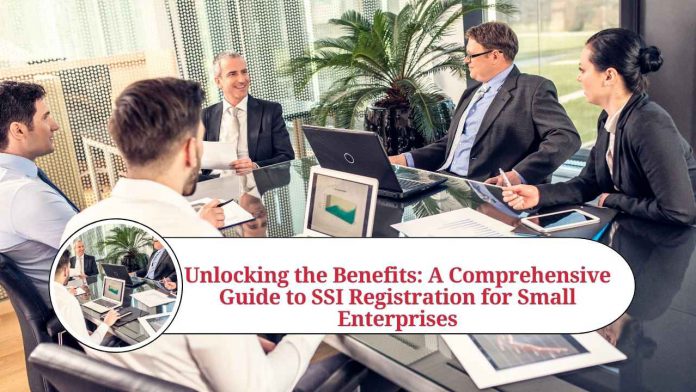Introduction
In today’s dynamic business landscape, small enterprises play a crucial role in fostering economic growth and innovation. To support and encourage their growth, governments around the world introduce various schemes and initiatives. In India, the government has introduced the concept of Small Scale Industries (SSI) registration, now known as Micro, Small, and Medium Enterprises (MSME) registration. This blog aims to provide a comprehensive understanding of SSI registration and its significance for small businesses.
Understanding SSI Registration
SSI registration refers to the process by which a small-scale enterprise can obtain official recognition from the government. This registration provides numerous benefits and support measures to foster the growth and development of these enterprises. In India, the registration process has evolved over time, and it is now governed by the Micro, Small, and Medium Enterprises Development (MSMED) Act, 2006.
Benefits of SSI Registration
- Financial Assistance: One of the significant advantages of SSI registration is the access to financial assistance and credit facilities. Financial institutions and banks often offer lower interest rates, collateral-free loans, and preferential treatment to registered MSMEs.
- Government Tenders and Subsidies: SSI-registered enterprises gain access to various government tenders, which can help them secure contracts and expand their business. Additionally, the government provides subsidies, grants, and incentives for registered MSMEs, further enhancing their competitiveness.
- Protection against Delayed Payments: Late payments from buyers can be a significant challenge for small businesses. With SSI registration, MSMEs can seek legal support through the Micro and Small Enterprises Facilitation Council (MSEFC) to resolve payment-related disputes effectively.
- Access to Infrastructure Facilities: MSMEs can benefit from various infrastructure facilities provided by the government, such as technology incubators, industrial estates, and cluster development programs. These resources create a favorable ecosystem for growth and innovation.
- Exemption and Concessions: SSI-registered enterprises may be eligible for exemptions or concessions on various taxes, such as excise duty, direct taxes, and sales tax. These cost-saving measures can significantly enhance their profitability and competitiveness.
- Intellectual Property Rights (IPR) Support: The registration also enables MSMEs to receive support for intellectual property rights protection. This can include assistance in patent filing, trademark registration, and copyright protection, fostering innovation and safeguarding business interests.
SSI Registration Process
The SSI registration process is relatively straightforward. Here are the key steps involved:
- Eligibility Check: Verify if your enterprise meets the eligibility criteria defined by the government. The criteria may include investment limits, employment criteria, and turnover limits.
- Documentation: Gather the required documents, including proof of identity, address proof, and relevant business documents like partnership deed or memorandum of association.
- Online or Offline Application: Submit the registration application either online through the Udyam Registration portal (https://udyamregistration.gov.in/) or offline at the District Industries Center (DIC) or other relevant authorities.
- Provide Information: Furnish the necessary information about your enterprise, such as business activities, investment details, employment details, and bank account information.
- Verification and Registration: The concerned authorities will verify the provided information and issue the SSI registration certificate upon successful completion. The certificate contains a unique Udyam Registration Number (URN) and other relevant details.
Conclusion
SSI registration, now known as MSME registration, plays a vital role in supporting the growth and development of small enterprises. By obtaining this registration, businesses can avail themselves of numerous benefits, including financial assistance, government support, infrastructure facilities, and protection against delayed payments. It is crucial for small business owners to understand the eligibility criteria and complete the registration process to unlock these advantages. Ultimately, SSI registration serves as a catalyst for the sustainable growth of small enterprises, enabling them to thrive in a competitive business environment.
Read more useful content:
Frequently Asked Questions (FAQs)
What is SSI registration?
SSI registration refers to the process by which small-scale enterprises obtain official recognition from the government, entitling them to various benefits and support measures.
What is the difference between SSI and MSME registration?
SSI registration was the earlier term used in India, which has now been replaced by MSME registration. MSME registration encompasses micro, small, and medium enterprises, providing a broader scope of coverage.
Who is eligible for SSI registration?
Enterprises engaged in manufacturing, production, processing, or preservation of goods, as well as service-oriented businesses, can be eligible for SSI registration. Specific investment limits and turnover criteria define the eligibility.
How can I apply for SSI registration?
You can apply for SSI registration online through the Udyam Registration portal (https://udyamregistration.gov.in/) or offline at the District Industries Center (DIC) or other relevant authorities.
What documents are required for SSI registration?
The required documents generally include proof of identity (Aadhaar card, PAN card, etc.), address proof, and relevant business documents such as partnership deed or memorandum of association.
What are the benefits of SSI registration?
SSI registration offers benefits such as financial assistance, government tenders and subsidies, protection against delayed payments, access to infrastructure facilities, tax exemptions, and intellectual property rights support.
Is SSI registration mandatory for small businesses?
SSI registration is not mandatory but highly recommended for small businesses, as it provides access to a range of benefits and support systems that can enhance their growth and competitiveness.
Can a business with multiple locations obtain SSI registration?
Yes, businesses with multiple locations can obtain SSI registration. Each unit or branch is considered individually, and registration can be obtained for each eligible location.
Is there a fee for SSI registration?
The registration process is free of charge. However, be cautious of fraudulent entities or consultants who may charge a fee for assisting with the registration process.
Can SSI registration be modified or cancelled?
Yes, SSI registration can be modified if there are any changes in the enterprise’s details. Similarly, if a registered enterprise ceases operations or no longer meets the eligibility criteria, the registration can be canceled or updated accordingly.




















